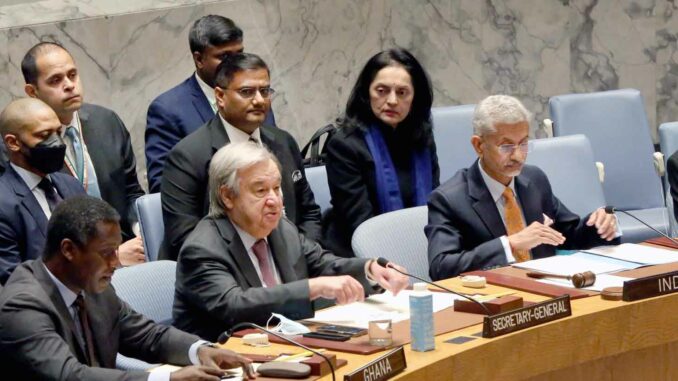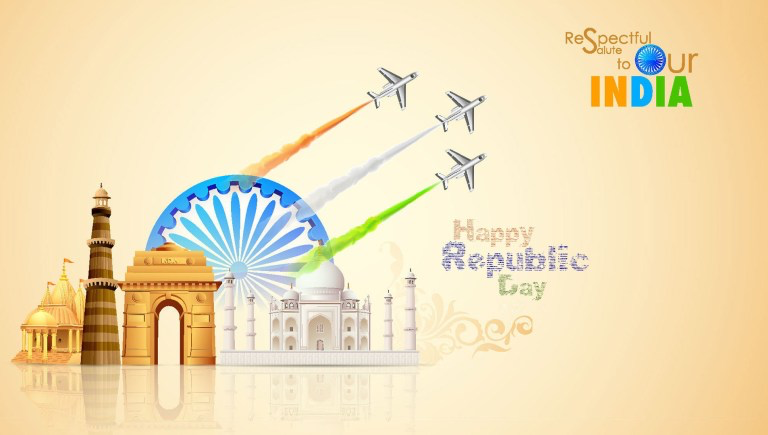
UNITED NATIONS (TIP): Without mincing words, External Affairs Minister S Jaishankar called out Pakistan and China in his address to the UN Security Council, saying the “contemporary epicenter of terrorism” remains very much active and “evidence-backed proposals” to blacklist terrorists under sanctions regimes are put on hold without assigning adequate reason.
“We cannot forget that old habits and established networks are still alive, especially in South Asia. The contemporary epicenter of terrorism remains very much active, whatever gloss may be applied to minimize unpleasant realities,” Jaishankar said in his address to the UN Security Council briefing on ‘Global Counterterrorism Approach: Challenges and Way Forward.’ held under India’s Presidency of the 15-nation Council. “We cannot let another “9/11 of New York” or “26/11 of Mumbai” happen again,” he said, asserting that combating terrorism is a battle in which there is no respite. “The world cannot afford attention deficit or tactical compromises. It is most of all for the Security Council to lead the global response in this regard.”
Jaishankar presided over the Council and in a statement made in his national capacity, called out Pakistan and its all-weather ally China, which has been putting holds on proposals by India to blacklist Pakistan-based terrorists and entities under the 1267 Al Qaeda Sanctions Committee.
“By now, it is well established where and how terrorist organizations operate, and under what kind of protection. Activities like recruitment, financing and motivation are often done in the open. The days when it could be said that we were unaware are now behind us.
“Consequently, assigning responsibility is that much easier. The response of the sponsors of terrorism is not to give up but to conduct and execute their agenda at an arms-length. To do this, they create narratives of limitations and difficulties. We buy such explanations at our own peril. The suggestion that states who are apparently capable of everything else but are only helpless when it comes to terrorism is ludicrous. Accountability must therefore be the bedrock of counter-terrorism,” he said.
Jaishankar added that the working methods of relevant mechanisms are also a subject of legitimate concern and debate.
“At one level, we have seen protections that come close to justification. Then, there are evidence-backed proposals that are put on hold without assigning adequate reason. Conversely, there has even been recourse to anonymity so as to avoid taking ownership of untenable cases,” he said, a reference to China.
In the past five months, China, a permanent, veto-wielding member of the UN Security Council has put holds on as many listing proposals made by India and the US to designate Pakistan-based terrorists under the Council’s 1267 Al Qaeda Sanctions Committee regime.
Since June this year, China, Islamabad’s all-weather ally, has put holds on proposals to blacklist Pakistan-based terrorists Hafiz Talah Saeed, Lashkar-e-Taiba leader Shahid Mahmood, Lashkar-e-Tayyiba terrorist Sajid Mir, senior Jaish-e-Mohammed (JEM) leader Abdul Rauf Azhar and Abdul Rehman Makki under the Al Qaeda Sanctions regime. India and the US had submitted proposals to designate the Pakistan-based terrorists and subject them to asset freeze, travel ban and arms embargo but hit stumbling blocks when Beijing placed holds on the proposals.
Highlighting four specific challenges with which the counter-terrorism architecture is currently grappling, Jaishankar pointed to the issue of terror financing and State culpability, whether by commission or omission. “The world may no longer be willing to buy the justifications and cover ups as in the past. Through bitter experience, we know that terror is terror, whatever the explanation. The question now arises as to the responsibilities of the state from whose soil such actions are planned, supported and perpetrated.”
He also stressed the need to addressing double standards in countering terrorism, leading to concerns of politicization. “Uniform criteria are not applied to sanctioning and prosecuting terrorists. It would seem sometimes that the ownership of terrorism is more important than its actual perpetration or its consequences.”
He underlined the challenge of ensuring the integrity and accountability of the counter- terror multilateral mechanisms and their working methods. “They are on occasion opaque, sometimes driven by agendas and at times, pushed without evidence.”
He began his address by telling the Council that India faced the horrors of cross border terrorism long before the world took serious note of it. “Over the decades, we lost thousands of innocent civilian lives. But we fought terrorism resolutely, bravely and with a zero-tolerance approach.”
He cited Prime Minister Narendra Modi who has declared: “we consider that even a single attack is one too many and even a single life lost is one too many. So, we will not rest till terrorism is uprooted.”
He said the briefing is part of India’s ongoing efforts in the Security Council to re-invigorate the counter-terrorism agenda. “And that is overdue because the threat of terrorism has actually become even more serious. We have seen the expansion of Al-Qaida, Da’esh, Boko Haram and Al Shabab and their affiliates. At the other end of the spectrum are ‘lone wolf’ attacks inspired by online radicalization and biases.”
Jaishankar said that countering threats from the misuse of new and emerging technologies by terrorists is “likely to be the next frontier of our battle.”
He noted that the third challenge is “how do we deal with differential standards, both inside and outside this Council. For too long, some have persisted with the belief that terrorism is just another instrument or stratagem. Those invested in terrorism have used such cynicism to carry on. It is not just plain wrong but could be downright dangerous, even for the very people whose toleration extends this far.”
The fourth challenge is the growing potential for the misuse of new and emerging technologies by extremists, radicals and terrorists. “Over the years, they have diversified their funding portfolio and expanded their recruitment toolkit. They exploit the anonymity afforded by new and emerging technologies such as virtual currencies for fundraising and finances. Terrorist groups are taking advantage of openness of democratic societies, spreading false narratives, inciting hatred, and radicalizing ideologies.” He said that taking all these into account, we need to adopt a comprehensive, contemporary and result-oriented approach to this set of challenges.
“No individual state should endeavor to seek political gain from terrorism and none of us collectively should ever put up with such calculations. When it comes to tackling terrorism, we must overcome political differences and manifest a zero-tolerance approach.”
(Source: PTI)




Be the first to comment